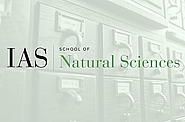Joint IAS Princeton University Astrophysics Colloquium
Sep
17
2019
Institute for Advanced Study/Princeton University Joint Astrophysics Colloquium
The Galactic Center: A laboratory for the study of the physics and astrophysics of supermassive black holes
Tuan Do
11:00am|Bloomberg Hall Lecture Hall
Sep
10
2019
Institute for Advanced Study/Princeton University Joint Astrophysics Colloquium
Teasing Out the True Milky Way
Alyssa Goodman
11:00am|Bloomberg Hall Lecture Hall
Apr
30
2019
Institute for Advanced Study/Princeton University Joint Astrophysics Colloquium
The Black Hole Shadow in M87
Dan Marrone
11:00am|Princeton University, Peyton Hall, Auditorium, Room 145
Apr
23
2019
Institute for Advanced Study/Princeton University Joint Astrophysics Colloquium
A Magnified Vision of How Galaxies Evolve
Jane Rigby
11:00am|Princeton University, Peyton Hall, Auditorium, Room 145
Apr
16
2019
Institute for Advanced Study/Princeton University Joint Astrophysics Colloquium
Observing Planet Formation
Sean Andrews
11:00am|Princeton University, Peyton Hall, Auditorium, Room 145
Apr
09
2019
Institute for Advanced Study/Princeton University Joint Astrophysics Colloquium
Light Echoes of Eta Carinae, Massive Star Mergers, and Pre-Supernova Eruptions
Nathan Smith
11:00am|Princeton University, Peyton Hall, Auditorium, Room 145
Apr
02
2019
Institute for Advanced Study/Princeton University Joint Astrophysics Colloquium
Measuring Black Hole Masses in Early-Type Galaxies with ALMA
Aaron Barth
11:00am|Princeton University, Peyton Hall, Auditorium, Room 145
Mar
26
2019
Institute for Advanced Study/Princeton University Joint Astrophysics Colloquium
Constraining Cosmic Reionization with Hubble, James Webb, and WFIRST
11:00am|Princeton University, Peyton Hall, Auditorium, Room 145
Mar
12
2019
Institute for Advanced Study/Princeton University Joint Astrophysics Colloquium
The Origin and Demographics of Long-Period Giant Planets
Brendan Bowler
11:00am|Princeton University, Peyton Hall, Auditorium, Room 145
Mar
05
2019
Institute for Advanced Study/Princeton University Joint Astrophysics Colloquium
A Predictive Theory of Star Formation and Turbulence Driving Across Cosmic Time
Blakesley Burkhart
11:00am|Princeton University, Peyton Hall, Auditorium, Room 145
